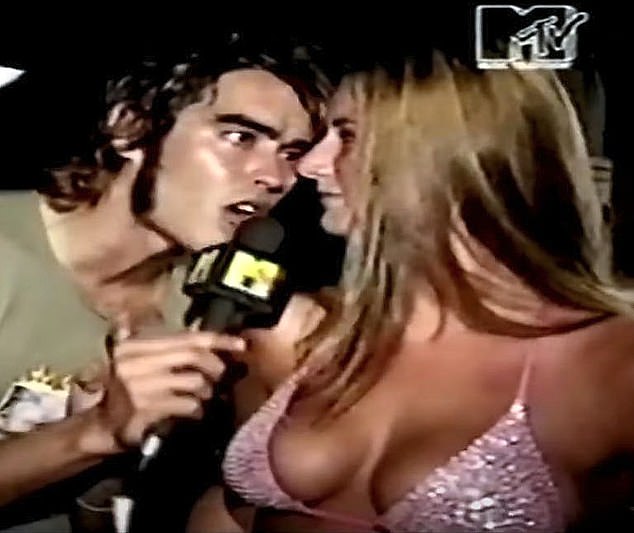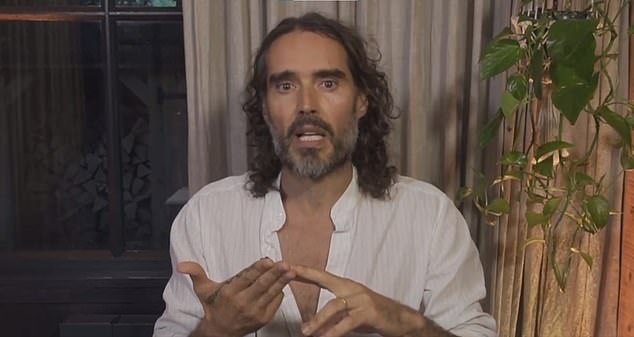MICHELLE BROMLEY: ‘What’s the point of you?’, Russell Brand sneered in front of my MTV colleagues – after I’d said no to a date
It’s been many years since I learned exactly what kind of person Russell Brand really is.
I was a naive 20-year-old intern at MTV at the time, in the early days of Brand’s career, and I thought maybe I was the only one he brought to tears.
Now I know I was far from that. And I can say with certainty that TV executives were not only aware of his emotionally abusive behavior from the start, but they tolerated and even celebrated it.
I had started my internship at the MTV production studios in Camden in March 2001. It was exciting, but I was also terrified. There was nothing sophisticated or confident about me – I was young and green, with no experience in the television industry. I was shaking in meetings, but thought I would impress my bosses by working hard.
MTV was at the height of its influence and Brand, then 25, was the channel’s rising star. He was “discovered” on the stand-up comedy circuit and brought on board as a video journalist, pulling pranks and conducting celebrity interviews.
It’s been many years since I learned exactly what kind of person Russell Brand really is. I was a naive twenty-year-old intern at MTV at the time

In 2001, MTV was at the height of its influence and Brand, then 25, was the channel’s rising star
Some days he would stroll around the office and he seemed very sweet. But I had heard claims that he was sleeping with a lot of girls and using hard drugs.
I even heard that he was banned from using MTV’s private taxi company for allegedly taking drugs in the backseat.
But the channel’s executives didn’t seem too concerned. After all, he was their new talent.
We were filming a segment with former Boyzone singer Stephen Gately one day when Brand walked up to me and locked eyes with me. “Hello Michelle, how are you?” He said, looking me up and down as if he were sizing me up for his pleasure.
“I think you’re really beautiful,” he continued. “You look like Sade (the English-Nigerian singer).” It was a lazy comparison, even offensive, considering I’m mixed race. We don’t even look alike.
Then he asked me out to dinner. I knew what that meant: he was asking me to sleep with him.
I declined as politely as possible, stumbling a little over my words. I had a boyfriend, but even if I didn’t, I knew his reputation. If I’m honest, I wouldn’t know how to deal with him.
Undeterred, he asked if I was free later in the week, or out for a drink. Again I tactfully turned him down.
Over the next few weeks he was noticeably colder towards me. Then, one Friday evening in June, we all went to a pub in Camden, Henry J Beans.
Brand was at the bar with a group including Sumi Connock, now the BBC executive producer working on Strictly Come Dancing, and James Longman, who produced James Corden’s The Late Late Show.
With them, incongruously, was a homeless, drug-addicted friend of Brand’s, someone he had met outside the pub and who was holding a blanket that smelled of urine.
I had just ordered a rum and coke when Brand came up to me. “Look,” he sneered, his voice full of contempt. ‘You have no personality. You have nothing to say. During meetings you just smile.’

Brand strolled around the office some days and seemed quite nice. But I had heard claims that he was sleeping with a lot of girls and using hard drugs
I was frozen in shock. Colleagues just laughed, or turned away and pretended it hadn’t happened.
Some had prestige and influence, but chose not to say anything. I was an intern and barely paid enough to cover my rent.
It speaks volumes that the only person who had enough decency to confront Brand was his homeless friend. “You can’t talk to her like that,” he said.
But Brand continued. ‘You can’t say anything now, can you? All you do is smile.”
The entire group stared as he delivered his final insult, “What’s the point?”
I felt exhausted. I put down my drink and left in tears. I remember calling my father, hysterical, unable to breathe. I felt worthless, the laughing stock in the office.
Brand had exposed my insecurities to humiliate me – all because I had dared to reject his sexual advances.
Of course, I know this moment cannot be compared to the experiences of other women who claim Brand sexually assaulted them, he claims.
But it changed me. It was on top of the generally toxic boys’ club mentality at MTV that ripped me and other interns to shreds. My self-esteem plummeted. And eventually I needed therapy because I lost all confidence in public speaking.
It has scarred me for years. But for Brand and everyone else at MTV, I expect it will barely register. In fact, I know it wasn’t because I bumped into Russell coming out of Topshop on Oxford Street the day after I left.
“Oh, hi Michelle,” he said lightly. ‘Would you like to come and have a drink with me?’
I looked at him in surprise. He had traumatized me, but there was no sign that he even remembered, let alone cared.
